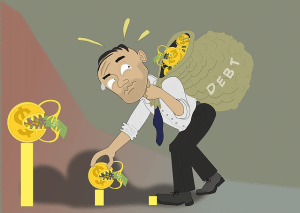Download this series as a free eBook here.
Over the past three months, we’ve spent time understanding why debt can spiral out of control and what it means when your accounts get handed over. We’ve looked at the cost of avoiding debt collectors, your rights to respectful treatment by debt collectors, and offered a strategy to pay back what you owe, possibly getting a discount on your outstanding debt.
This week, we are going to look at some behaviours that are trapping you in debt and what you can do to break these habits.
1. Avoidance
It’s not uncommon to push overwhelming financial anxieties aside. Most people are susceptible to this. However, avoiding debt collectors can make your life harder because it adds to the amount of money you owe. Not only do you pay interest on outstanding debt, but debt collectors also add their fees on top of your outstanding debts when you get handed over. Avoiding debt collectors has a real financial impact.
You can start solving this problem without having to spend any money:
- Make a list of everything you owe and
- Answer the phone if a debt collector calls
That’s a giant leap in the right direction!
2. Accepting “debt is the only way”
As children we internalise messages from our parents even when they’re not trying to teach us anything. If your family of origin had a love-hate relationship with debt, you may have adopted their financial habits. Perhaps your parents lacked the education or the resources to live a debt-free life, but emulating their financial choices is not your only option.
As with avoidance, solving this problem doesn’t cost a cent. Simply identifying financial habits you didn’t choose is a wonderful first step in making better financial choices.
3. Living in the future
Most of us struggle to find a balance between the life we can afford and the life we deserve. This can easily trap us in a debt cycle. We think we’ll be able to live within our means once we start earning more money. Unfortunately we don’t always have control over how much money (if any) we’ll earn in the future. We also tend to increase our cost of living as our salary increases.
Avoiding this trap comes down to assuming what we currently have is all we’ll ever have. If a bonus or windfall happens to come your way, you can make choices about how to spend it, once the money reflects in your account. Debt is borrowing money from your future for your present. If you can learn to live (and spend) in the moment, debt becomes far less tempting.
4. Immediate gratification
Many of us use frivolous purchases to feel better when we’re having a tough time emotionally. Buying something can make us feel better in the moment, even when we know it’ll harm us in the long run.
One way around impulse buying, is having a clear idea of what kind of life you’re working towards. If you want a beautiful home, spending money on items that will clutter up your space makes no sense. If you want to live a healthy, outdoorsy life, spending your money on junk food doesn’t make sense. Once you know what you want your money to do, your spending falls into place quickly.
You can break your immediate gratification habit by asking yourself if each purchase is getting you closer to the life you really want. Mindful spending will reduce the amount of new debt you take on and ensure that the money you do spend, means something to you in the long run.
5. Aiming to please
Sometimes we spend money to buy social acceptance. We don’t want to appear poor and we don’t want to miss out on the things our friends can afford to do. Sometimes we even use debt to make it seem like our lives are far more glamorous than they are.
If you’re in debt, you already know how deceiving appearances can be. A better car or a new pair of jeans often means more debt, not more money. Are the big spenders around you perhaps also in debt?
We are social animals and we want to fit in. This is our evolved biology and is unlikely to change. However, we can choose communities that reflect our values and avoid communities that make us feel like we have to prove ourselves.
Debt can be the solution to a problem in the short term, but once short-term debt becomes a habit, your ability to build a future is compromised. Spend some time understanding which of these behaviours is trapping you in a debt spiral.
PREVIOUS ==>> My rights
This series will help you gain control of debts that have spiralled out of control. We will explain what it means to be handed over for collection and how that differs from debt review, debt consolidation and insolvency. We will help you understand your rights as a consumer and offer some debt management strategies. This series is possible with the help of VeriCred, our partners in debt education.





